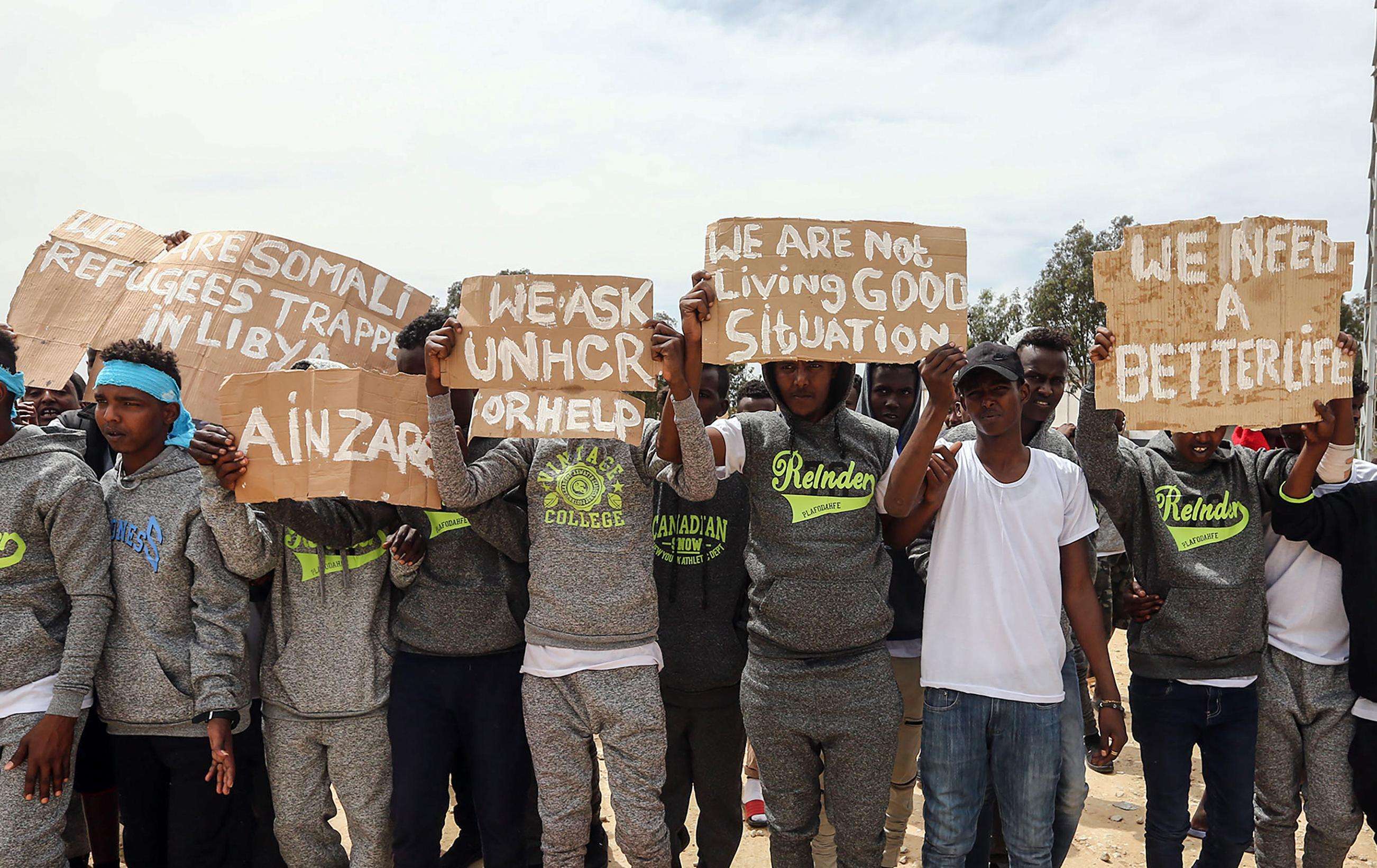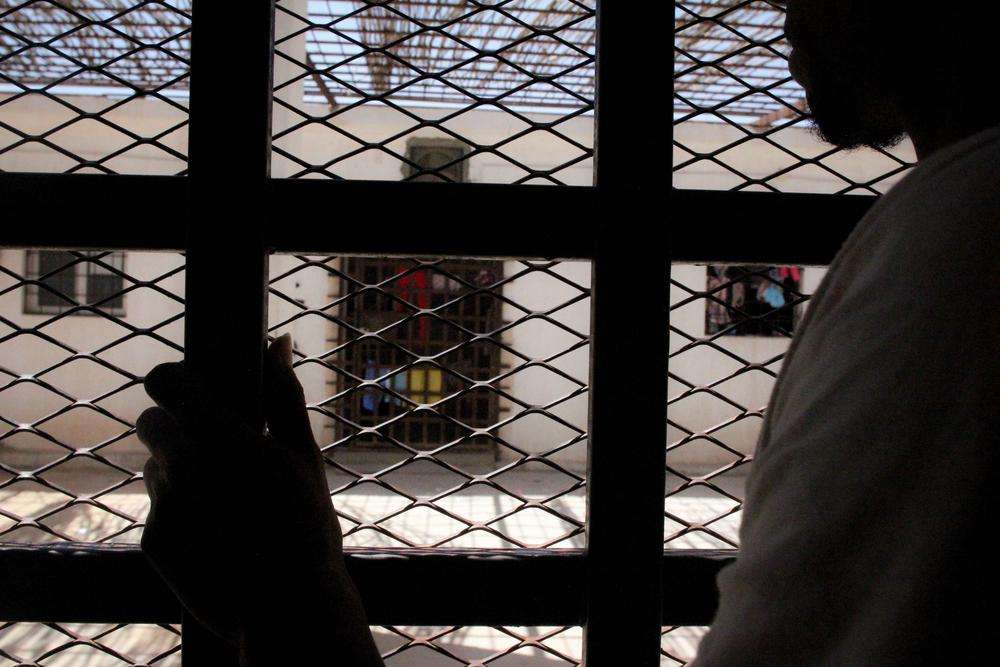Doctors Without Borders/Médecins Sans Frontières (MSF) is extremely concerned for the safety of civilians in Tripoli as escalating fighting forces thousands of Libyan families to flee their homes and seek shelter. We urgently call for the immediate evacuation of the more than 3,000 refugees and migrants trapped in detention centers who are at risk of being caught in the crossfire.
Civilians at risk
As of April 16, there have been 1,005 casualties—including 189 people dead and 816 wounded—according to the World Health Organization (WHO). Health workers and services have been affected by indiscriminate shelling and daily airstrikes, which have increased in densely populated areas over the past several days. Since the start of the conflict, two doctors and one ambulance driver have been killed, another doctor injured, and nine ambulances damaged or destroyed, according to WHO.
All measures must be taken to protect civilians and civilian infrastructure, including by not carrying out indiscriminate attacks in highly populated areas. Medical personnel must be respected and protected in all circumstances.
Medical facilities both in and outside of Tripoli have reported limited capacity and less than two weeks of medical supplies remaining. Some civilians in the city have been without water and electricity for several days. For the more than 3,000 refugees and migrants currently trapped in detention centers in or near the conflict areas, the provision of basic services including food and water remains extremely limited, with reports of many not eating for several days at a time.
The fighting has also had a detrimental impact on the mental health of people in detention, with MSF teams observing a heightened sense of anxiety and fear among many patients, some of whom have reported hearing gunfire and airstrikes close by while trapped in the detention centers.
Trapped near the front lines
MSF medical teams have been on the ground in Tripoli since the start of the conflict, providing primary health care and emergency food, water, and medical referral services for refugees and migrants in four detention centers across the city. We have also delivered three-week supplies of essential medications for tuberculosis and other diseases to patients in detention centers to ensure that treatment continues amid the ongoing conflict.
MSF medical teams have also provided hygiene kits in several shelters for displaced families that had to flee their homes, as well as a donations of kits containing supplies for the treatment of war wounds (sutures, dressings, and essential medication) to two hospitals, one in Tripoli and another south of the city.
Over the past week, MSF teams provided medical consultations in the Anjila, Abu Salim, Sabaa, and Tajoura detention centers, and made two deliveries of potable water to Tajoura. While the local community has been providing food to detainees at the Tajoura centre, no permanent solution has been identified by the Libyan authorities, leaving MSF extremely concerned for the wellbeing of more than 600 people trapped inside.
In Sabaa detention center, in addition to providing medical consultations, MSF teams have distributed a much-needed five-day supply of food rations, including fresh vegetables. In recent days, approximately 200 people were moved from the Ain Zara detention center, just under a mile from the front line, to Sabaa detention center, which is about four miles from the front line. With these new arrivals, the number of people detained in Sabaa has surged to nearly 540, exacerbating already poor conditions and services. With an additional 150 refugees relocated early last week to the United Nations High Commissioner for Refugees (UNHCR) Gathering and Departure Facility, Ain Zara detention center is now believed to be empty.
While the numbers in each detention centres are subject to change daily, currently there are 135 people in Anjila detention center, which is just 3.4 miles from the fighting. A few days ago there were still around 910 people in Abu Salim, four miles from the fighting. This detention center is most likely to be directly affected by conflict in the coming days, as shelling already occurred in the Abu Salim neighborhood during the night of April 16. UNHCR is conducting a relocation exercise to move some of the most vulnerable people from Abu Salim to the Gathering and Departure Facility, but lacks the capacity to take everyone.
Needs beyond Tripoli
While we closely monitor conditions, our activities continue outside of Tripoli, where our teams are providing assistance to more than 800 people arbitrarily detained in Khoms, Zliten, and Misrata. MSF also continues to carry out medical consultations in Bani Walid.
We are also concerned about a group of more than 80 patients who were transferred about two months ago to a detention center in Sirte. Since this transfer we have been unable to follow up and treat these people, many of whom have serious medical conditions. Medical referrals to Tripoli hospitals organized by MSF teams from Khoms, Zliten, Misrata, Bani Walid, or Sirte are no longer possible due to the current conflict.
European governments must agree on solutions to save lives
The current fighting in Tripoli—the third spate of violence in the past seven months—only further underscores the irrational attempts by European governments to pretend that Libya is a safe place for migrants and refugees.
One of the very few desperate options available for Libyans and non-Libyans seeking to escape the fighting is to attempt crossing the Mediterranean Sea. Though MSF is unable to verify if sea departures from Libya have increased since the fighting began, we do know that—absent any dedicated search and rescue response in the Central Mediterranean—people’s lives are as significantly at risk at sea as they are in war-torn Tripoli.
Search and rescue capacity in the Central Mediterranean must be urgently increased, and anyone rescued at sea must be taken to a safe port as required by international law. This can only effectively happen if European member states immediately agree on solutions to disembark survivors in safe ports and put an end to punitive actions to curtail nongovernmental organizations—including MSF—seeking to provide lifesaving humanitarian response at sea.





